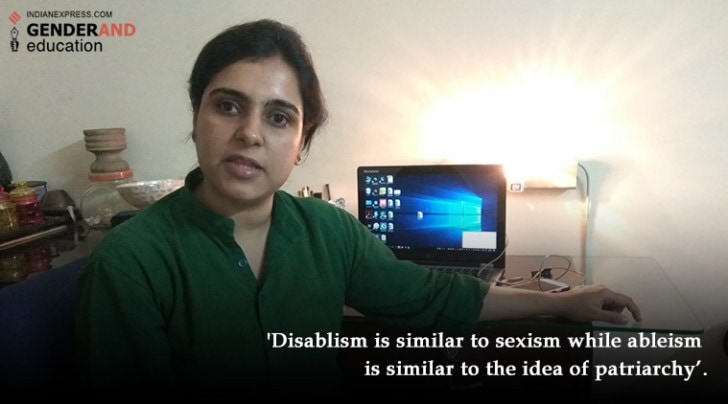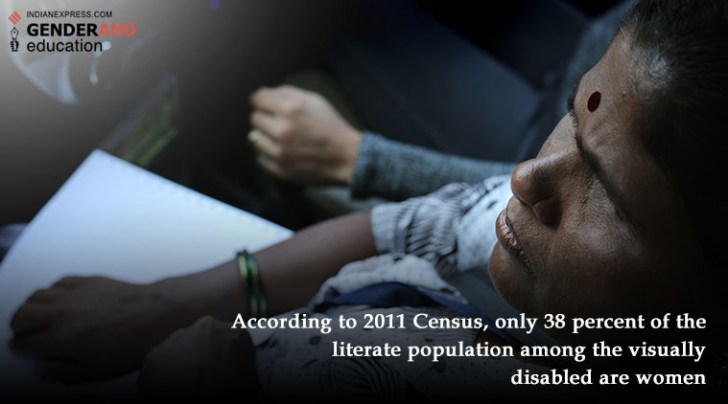#GenderAnd Education | The GST announced by the government recently, that is set to be launched on July 1, imposes five to 18 per cent taxes on a range of aids and appliances used by persons with disabilities including Braille Paper and typewriters.
“I am a disabled person and not divyang. I don’t want to stand out like some star to highlight I am a blind woman,” says Sharmishtha Atreja, Assistant Professor at Department of Philosophy at University of Delhi. Sharmishta is 30 years old and suffers from Retinitis Pigmentosa — a genetic condition that led to blindness early on in her life.
On December 25, 2015, Prime Minister Narendra Modi in his radio program ‘Mann ki Baat’ proposed that the term ‘divyang’ (divine body) should be used for persons with disability instead of ‘viklang’ (disabled). “Though I am apolitical, I have reservations about how this current government is rephrasing the terminology involving the disabled,” says Sharmishta as she explains that the term divyang refers to ‘pushing the burden to God.’
According to 2011 Census, 62 per cent of the literate population among the visually disabled are men. The trend is reversed among illiterate population as more than 58 per cent of them are women.
The Goods and Service Tax (GST) announced by the government recently, that is set to be launched on July 1, imposes five to 18 per cent taxes on a range of aids and appliances used by persons with disabilities including Braille Paper and typewriters. All these appliances and devices were till date exempt from all taxes like Sales Tax, VAT, Excise, Customs etc. This will change with GST.
According to a press statement issued by the Disability Rights Organisations’ Forum, “This proposal militates against the spirit and mandate of the Rights of Persons with Disabilities Act, 2016 which obliges the State to provide all aforesaid assistive devices, equipment and Braille books to persons with disabilities either free or at affordable cost.”
In her three-room, neatly organized apartment in North Delhi, the voice on the speaker booms as Sharmishta’s fingers move swiftly on the touchpad of her small laptop. She is updating her commute music playlist. As the cursor hovers over tiny icons on her home screen, the text-to-speech synthetic voice on the speaker obediently calls out their names. She soon puts the device on sleep mode. “So you have already seen how I use my laptop,” she sheepishly grins.
Sharmishta says the language used for disabled people by the government is in dire need of reorientation especially when it comes to distributing aid like wheelchairs or canes. “It is usually publicised that these things have been donated. The fact is that it is not donation. The government is required to provide amenities for the disabled as it is our right.”
 Sharmishtha has a disdain for the constant gaze of pity for disabled women. “Women with disability must put their foot down and say they are independent,” she says. (Source: Express Photo)
Sharmishtha has a disdain for the constant gaze of pity for disabled women. “Women with disability must put their foot down and say they are independent,” she says. (Source: Express Photo)
Activists often point out that in India, words like ‘andha’ (blind) and ‘kaana’ (person blind in one eye) are often used in derogatory manner. Sharmishta points out that the popular narrative around disabled people is extremely patronising. She says, “In the CBSE books, why are there no stories about students respecting their blind teachers? Why is emphasis laid down on just ‘helping’ the blind people?”
Growing up in Faridabad, Sharmishtha’s teenage life was rife with struggles as she tried to come to terms with her blindness. “I remember once somebody came at our house for a survey asking if there were any disabled people in our house. I shouted out saying no and slammed the door,” she recalls. “In your growing years, especially during puberty, it becomes very difficult to even accept this is happening to you.”
In a report published by the National Federation of the Blind, author Barbara Pierce notes that young blind women, who are approaching adolescence, face multiple social problems owing to the age group they belong to. “People, my age, were going to cafes, restaurants and talking about boyfriends. It bothered me then that I had to spend time in a centre and miss out on common teenage fancies,” Sharmishta reminisces. With a hint of mischievousness in her eyes, she shares how she had to bang her head against the wall multiple times while she was in the centre so that her family would take her home.
Sharmishtha has a disdain for the constant gaze of pity for disabled women. “Women with disability must put their foot down and say they are independent. I have even helped with the family business. Even today, I am the only one who is earning in the family,” she says.
At workplace, there are a number of challenges that crop up for this Philosophy expert due to her blindness. “As a professor, students often do not accord me the respect befitting of my position. When it comes to my colleagues, if there are some documents that need our signatures, I am often unaware of it since nobody comes and tells me,” she says. “The least they could do is at least pass on the paperwork and tell me where to sign,” she says.
Narrating instances when she would go to somebody with any work-related request, Sharmishtha claimed that people would ask their subordinates to tell her that they weren’t present. “During one such incident, I threw my stick at the concerned person and said that I knew they were present there. They didn’t have to lie,” she says. Though these problems weakened her resolve, she decided to tackle the issue in her own manner.
Sharmishta’s younger sister Vageshwari now accompanies her to work which has led to a noticeable change. “Now, whenever a colleague passes by, she tells me so and so person is around. Then, they are left with no choice but to greet me out of courtesy,” she says as her sister, who has done her MSc in Development Extension in Jamia Milia Islamia, grins. Vageshwari says, “We have this joke going on that while two of us go to work, only one person gets paid.”
 In order to ensure an attitudinal shift, there is an urgent need to change existing perception revolving around blind people. (Source: Express Archive)
In order to ensure an attitudinal shift, there is an urgent need to change existing perception revolving around blind people. (Source: Express Archive)
In their book Approaching Disability: Critical Issues and Perspectives, authors Rebecca Mallett, Katherine Runswick-Cole draw parallels between sexism and disablism citing “disablism is similar to sexism while ableism is similar to the idea of patriarchy”. The conclusion is based on the fact that ableism is “concerned with the structures, practices and processes that assume, and work in favour of, those whom it deems ‘able’ and, in doing so, seeks to ‘erase’ disability.”
In order to ensure an attitudinal shift, there is an urgent need to change existing perception revolving around blind people. Sharmishta says that along with focusing on disabled schools, an integrated approach should be promoted. “When we teach sighted kids A for Apple, why not give them apples in their hands and ask them to feel it with their eyes closed. Touch it, smell it or taste it. That way, they will know how a blind person sees the world and it will help in making people more aware.”
Disability rights activists believe there needs to be a change in the education system including special focus on curricular and disabled-friendly infrastructure. Founder of the advocacy group Sruti Disability Rights Centre, Shampa Sengupta, says access to education is one of the major issues when it comes to blind women. “Society and family often hesitate in providing education opportunities for young blind girls as their safety is an issue,” she says. “Families have this mindset that if something untoward happens, what will they do.”
Sharmishta, drawing from her own experience says that exploitation of blind women often comes in the disguise of ‘help’. “When people direct me, they often put their hands around my shoulders. Will one do the same with a sighted person?” She points out,“I experience conflicting thoughts whether I should gently remove their hands or be firm. I wonder if one can be fiercely assertive when they are getting help from someone.”
Blind women are not safe even in places which are often supposed to be the centres for their empowerment. “Even in hostels for blind women, instances of sexual violence are not uncommon. It is difficult for them to fight back since they cannot identify who touched them inappropriately. Everything just adds up to the vulnerability of blind women,” says Shampa.
Sharmishtha asserts that security is a crucial concern when it comes to blind women. “I think there should be a different wing for safety issues along with sensitisation programmes which deals with persons with disabilities. Beneficiaries and stakeholders often are not aware of their rights since they are not sensitised to this,” she says.
A study conducted by All India Confederation of The Blind too mentions that blind women often need to be escorted to workplaces or education institutions owing to security concerns. “Mobility training is important for visually impaired women else they will become dependent and would be unable to move alone,” she says. This is an obstacle in the way of blind women’s access to education. Shampa says, “Drop-out rates are high among disabled women.” She recounts an instance where among the two visually impaired kids in a family, the girl child had been left behind while the son moved to a metropolitan city to pursue his education.
The lack of educational opportunities has far-reaching consequences and has created a gender gap in terms of employment of blind people. “Employment is directly related to education. Very few people complete that level of education that is required for applying for jobs,” Shampa says. The rampant sexism in workplaces makes it worse for blind women who are often treated as vulnerable and subjected to infantilisation owing to their disability instead of being taken seriously for their intellect and skills.
Sharmishtha has learnt not to mope about her condition. She says, “As society evolved, human beings came up with measures to overcome their own disabilities. The policy-makers need to think in a similar manner. Provide alternatives to help us overcome this disability of ours. Because I don’t want to be treated as a bechaari (helpless) woman.”
#GenderAnd — Rethinking how we cover gender in mainstream media. Click here to read about our new series. You can also help us find more such stories using #GenderAnd in your conversations.

Facebook comments